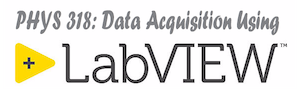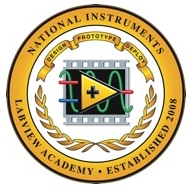Fall 2024 Welcome Message
Welcome to the Fall 2024 PHYS 318 Data Acquisition Using LabVIEW course. If you are enrolled in the course for the upcoming semester please watch the video message below for some guidance in getting your hardware and software ready for the semester The message, while created for the Fall 2020 semester, still mostly applies for Fall 2024. There are a few changes that will apply this semester that I point out below:
- The discussion of masking and social distancing no longer applies, according to our current university guidelines.
- We will use LabVIEW 2024 Q3 this semester instead of the version mentioned in the video.
- The bit.ly address listed in the video no longer works. Instead go to physics.wku.edu/phys318/content/u1/day01/.
Physics 318: Data Acquisition using LabVIEW
This course is a study of the use of computers for measurement and automation applications. Hands-on experience with data acquisition using LabVIEW will be gained through laboratory exercises and projects.
 Concepts to be studied will include:
Concepts to be studied will include:
- analog-to-digital conversion
- digital-to-analog conversion
- transducers
- signal conditioning
- virtual instrumentation
- data acquisition
- instrument control
- data manipulation and analysis
- data storage techniques
- data-flow programming
Students will learn to interface the computer to laboratory equipment using a graphical programming language called LabVIEW. Since its introduction by National Instruments in 1986, LabVIEW has become an industry standard for scientific research and industrial automation applications. Programs in LabVIEW are called virtual instruments because the combination of computer, data acquisition hardware and software can take the place of a traditional bench-top instrument.
PHYS 318 at WKU is now part of National Instrument’s LabVIEW Academy. Among other benefits this means that students in this course will have the opportunity to learn the material required to be successful on the Certified LabVIEW Associate Developer (CLAD) exam offered by NI.
The course is open to any students that have an interest in making physical measurements using a computer. Limited computer programming experience (at least CS 230) and at least two semesters of University Physics (or permission of the instructor) are required pre-requisites.




